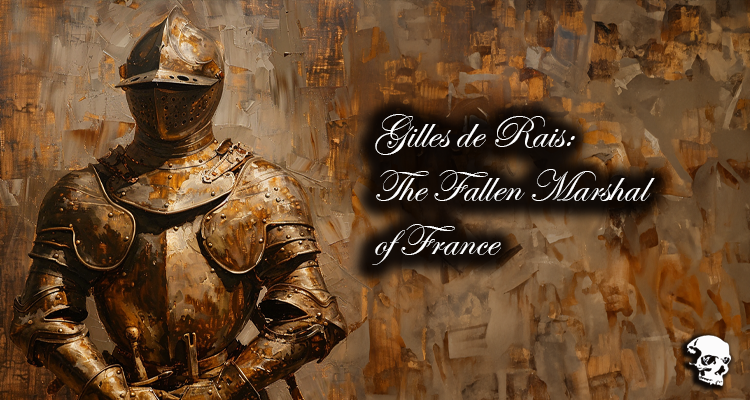Currently Empty: $0.00

Gilles de Rais: The Fallen Marshal of France
Gilles de Rais, celebrated as a marshal of France and a hero alongside Joan of Arc, is a figure shrouded in the darkest tales of medieval Europe. His postwar descent into alleged sorcery and murder is as dramatic as it is horrifying, offering a stark portrayal of a knight turned into one of history’s most monstrous figures.
A Hero’s Beginnings
Born into the noble family of Montmorency-Laval in 1405, Gilles de Rais quickly ascended the social ladder through advantageous marriages and military valor. His courage at the Siege of Orléans earned him the title of Marshal of France, and he was hailed as a defender of the French crown. His close association with Joan of Arc during critical battles of the Hundred Years’ War further cemented his reputation as a patriotic hero.
The Path to Perdition
The turning point in Gilles’ life came with the execution of Joan of Arc in 1431. Her death deeply affected him, leading to a gradual withdrawal from military and public life. As his fortunes dwindled due to extravagant spending on lavish castles and feasts, Gilles sought out alchemical solutions to restore his wealth. This pursuit introduced him to figures like Francesco Prelati, an Italian priest and magician, who promised Gilles that he could summon demons to reveal the secrets of the philosopher’s stone.
The Trial and Its Aftermath
During his trial, Gilles provided a detailed confession that included descriptions of the atrocities he committed against the children. Although some historians suggest that his confession was coerced through threats of torture, the evidence presented was overwhelming. He was found guilty of murder, sodomy, and heresy, leading to his execution by hanging and burning in October 1440. The swift justice that followed reflected the gravity of his crimes and the broader societal need to expunge his vile acts.
Delving Deeper into the Occult
Gilles’ castles became the backdrop for his obsession with the occult. He conducted numerous séances and sacrificial rituals in an attempt to contact demonic entities. These acts, intended to secure supernatural assistance in reversing his fortunes, were marked by increasing cruelty and deviation from the chivalric values he once embodied.
The Monstrous Accusations
In 1440, the shocking nature of Gilles’ private life came to light. Accused of the kidnap, molestation, and murder of potentially hundreds of children, Gilles was arrested and brought to trial. The proceedings revealed horrifying details, as servants testified to assisting Gilles in the abduction and disposal of his victims, painting a gruesome picture of his brutality.
Cultural Impact and Historical Debate
The legacy of Gilles de Rais challenges our understanding of historical narrative and justice. Some modern scholars argue that his trial was influenced by political motives or greed over his lands, suggesting a possible miscarriage of justice. His story has also permeated literature and popular culture, contributing to the folklore surrounding dark magic and serial murder in medieval Europe.
Looking Back on Gilles de Rais
Gilles de Rais serves as a somber reminder of the complexities of human nature and the dualities that can exist within a single individual—hero and monster, protector and predator. His life’s trajectory from gallantry to ghastliness continues to fascinate and horrify, compelling us to reflect on the depths of depravity to which despair and obsession can lead.
Are you enjoying this article or our site? Love of Gothic and the Dark Matters & Mischief magazine are run by dedicated volunteers, and we rely on crowdfunding to cover our expenses. Your support is crucial to keep us going! Consider becoming a paying member of our Patreon or purchasing something from our shop to help us continue providing content and community support. Thank you for your support!
